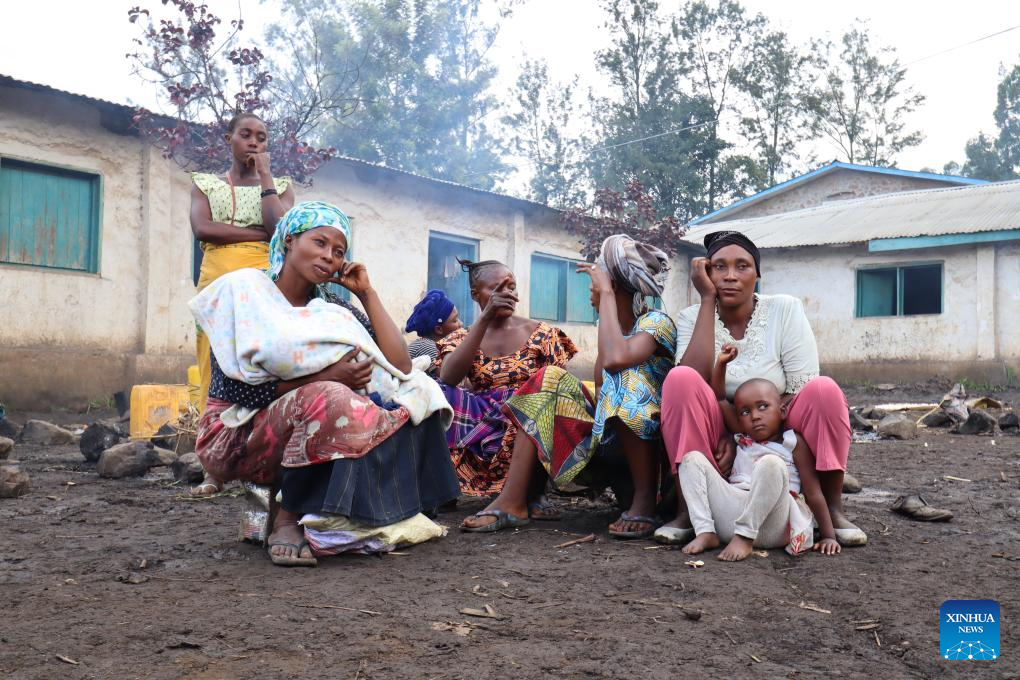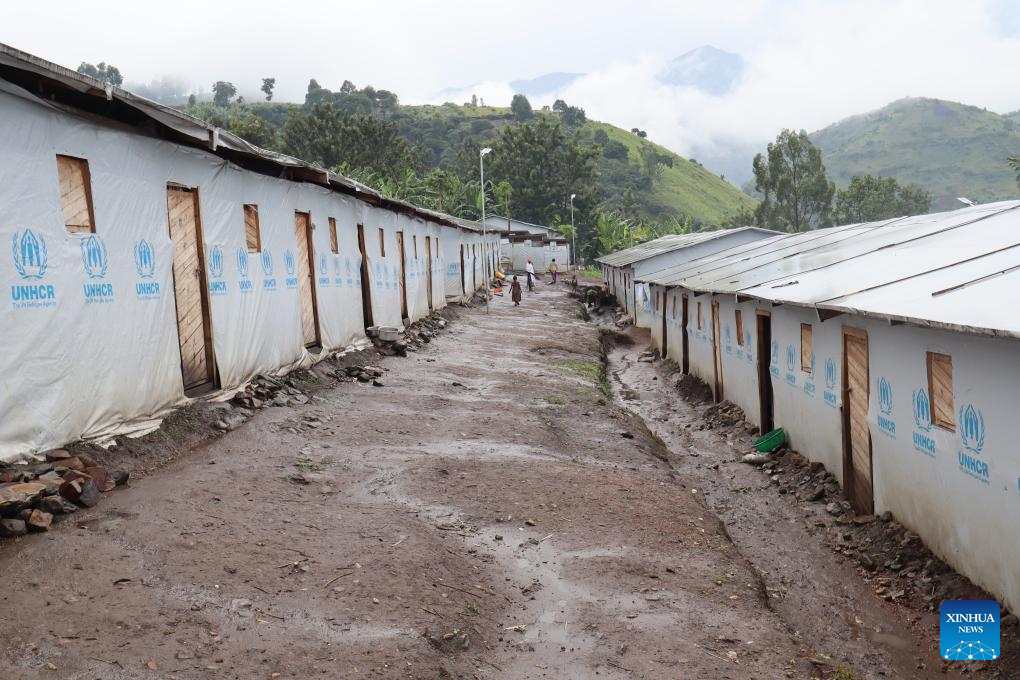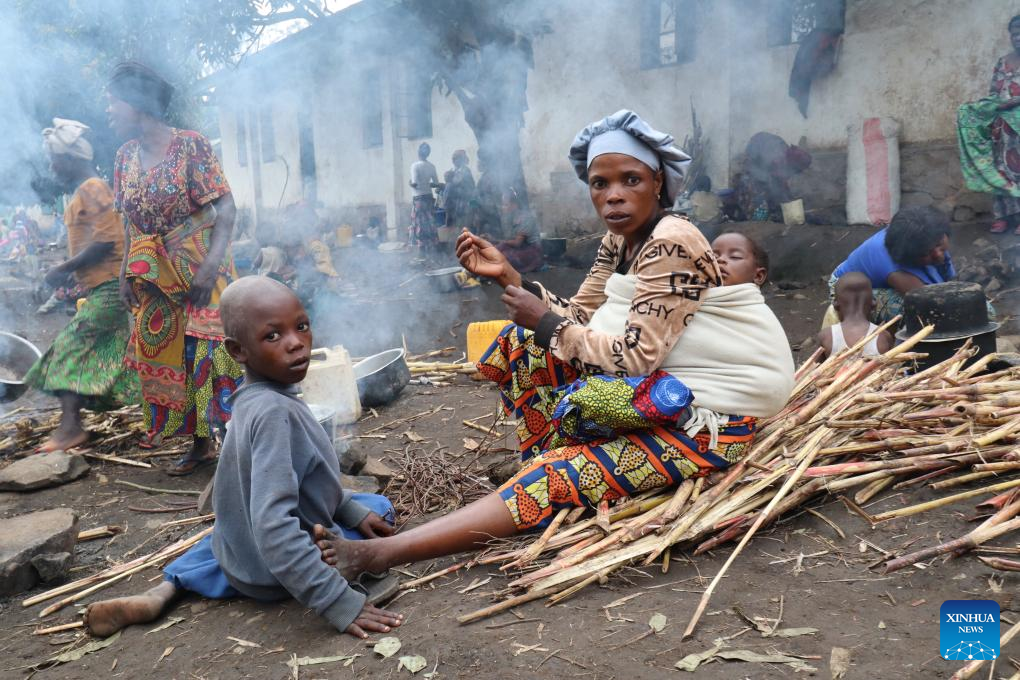
People rest at a refugee shelter in Minova, the Democratic Republic of the Congo (DRC), on March 12, 2024. (Photo by Alain Uyakani/Xinhua)
MINOVA, DRC, March 18 (Xinhua) -- With a population of about 46,000 residents and over 300,000 internally displaced persons (IDP), Minova, nestled between Lake Kivu and rugged mountains, is a city trapped in a decade-long humanitarian crisis in the eastern part of the Democratic Republic of the Congo (DRC).
Located on the shores of Lake Kivu in the eastern South Kivu province, the mountainous town of Minova, which once housed around 46,000 inhabitants, is now at its breaking point with the influx of the IDPs fleeing conflicts between the military and the rebels of the March 23 Movement (M23) in the neighboring North Kivu province.
In recent months, despite counter-attacks by Congolese military forces and their allies from neighboring countries, the M23 has still gained control over some towns and areas in the region, where Minova is now "completely cut off."
"As the fighting approaches our territory, we are completely cut off here in all aspects with our population and now the displaced persons crossing over from Masisi and other areas, putting us in even greater difficulty," said Jean-Paul Kanku, head of the administrative entity governing Minova and 12 surrounding villages.
For humanitarian workers in the region, while aid needs are constantly on the rise, the logistical challenges and security situation present enormous problems at the current stage in this part of the country.
Minova relies solely on boats, mainly wooden ones, plying Lake Kivu for its supplies. According to local authorities, boat rides between Minova and Goma, a strategic city and the capital of North Kivu, is haunted by M23 bombings.
On National Road No. 2 to the north, the route between Minova and Goma, spanning about 50 km, is blocked by hostilities between the military and the rebels, while to the south, the road is entirely impassable, destroyed at several points by landslides in the last rainy season.
A WORSENING CRISIS
According to the United Nations, Minova, spared thus far from the M23, is living through one of the most overlooked humanitarian crises, with attention primarily focused on Goma, which fears falling into the hands of the nearing M23 fighters.
"We need to draw the world's attention to what the displaced persons in Minova are currently going through since their arrival. With the ongoing security situation in the region and the isolation ... It is crucial to understand that this population urgently needs assistance," a member of the United Nations Office for the Coordination of Humanitarian Affairs in the crisis zone, who requested anonymity, told Xinhua.
The M23's advances have escalated security and humanitarian crises in the region. The DRC has accused Rwanda of backing M23 rebels, an accusation rejected by both Kigali and the M23 rebel group. Amid ongoing tensions, the international community and regional leaders continue to call for a political and peaceful solution, emphasizing the need for direct negotiations.
Under the mediation of Angolan President Joao Lourenco, both Rwandan President Paul Kagame and President of the DRC Felix Tshisekedi have agreed to the principle of holding a meeting to address the crisis. Ministerial delegations from both sides are working toward this goal, although the date and location of such a meeting are yet to be determined.
On the ground in Minova, hundreds of people, including women and children, who endured bombardments by the rebels, are crowded into makeshift sites, churches and a few host families in precarious conditions without any food aid delivered.
"I was forced to leave my home in Shasha (North Kivu province) in early February when the M23 rebels took control of my village under intense shelling. Many people were hit by gunfire along the way as we tried to move towards South Kivu," said Madeleine Muhoza, a mother of 12 children currently displaced in Minova, on the run for months.
Due to inadequate infrastructure and poor facilities, the IDPs settle in scattered school buildings throughout the city, sharing already limited space with students. In classrooms during the day, classes continue with displaced persons sleeping and heating their food at the back of the room, disrupting the lives of students and academic activities.
"This is an abnormal situation that we are witnessing here. Unfortunately, we have no choice, and we still try our best to salvage the school year, especially for the graduating classes," said Barbara Vivian, a teacher at a primary school for sixth-year students.
Local authorities and school officials also fear for the lives of students who have been mingling with the displaced persons, as cholera has already emerged since January. According to health authorities in the area, about 60 cases of cholera, including fatalities, have been reported. ■

This photo taken on March 12, 2024 shows a refugee shelter in Minova, the Democratic Republic of the Congo (DRC). (Photo by Alain Uyakani/Xinhua)
People rest at a refugee shelter in Minova, the Democratic Republic of the Congo (DRC), on March 12, 2024. (Photo by Alain Uyakani/Xinhua)



